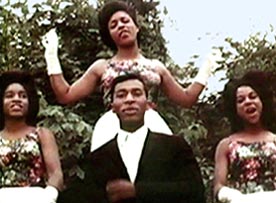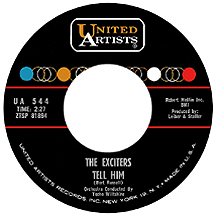THE EXCITERS
Tell Him
In late 1961, a record called "Follow the Leader" was released on Le Sage Records, a short-lived subsidiary of Old Town. It was by a four-member group of teenage girls from Jamaica, New York called The Masterettes, a female counterpart to local male group The Masters. An oddly structured ballad with strangely incoherent lyrics, it was an unlikely start for an act that would have a huge hit a year later under the guidance of one of the greatest of all producing teams. The Masterettes just needed a few breaks to get to that point.
Brenda Reid was the lead singer who would stamp her trademark on every one of the group's efforts. Her cohorts were Lillian Walker, Carolyn Johnson and Sylvia Wilbur. On the basis of that one shot-in-the-dark 45, the high schoolers secured a spot opening for Justine "Baby" Washington, Sam and Dave and Shep and the Limelites at Jamaica's Hillside Theater in the heart of the Queens neighborhood they called home. The Masters were on the bill too, but when "Big Al" Sears (the veteran saxophonist who played on "Castle Rock," the 1951 Johnny Hodges hit) showed up he was impressed, not by the guys, but the opening female quartet and Reid's assertive vocal style in particular. Despite this promising turn of events, not everyone was enthusiastic; Sylvia wasn't convinced the group's future was all that promising...and quit. Another friend, Penny Carter, took her place.
Sears took the girls to the Brill Building in Manhattan and introduced them to Jerry Leiber and Mike Stoller, those superproducers who had been at the controls of so many brilliant hits by The Drifters, The Coasters, Elvis Presley and a few dozen others. Jerry and Mike loved their audition, especially - and not surprisingly - Brenda Reid's lead vocals. In fact, the word they used was "exciting." The group was definitely going to get another shot at making a record, this time as The Exciters. "Tell Her," written by Bert Berns (as Bert Russell) and released in the summer of '62 by Gil Hamilton (who changed his name to Johnny Thunder about that time on the way to scoring big with "Loop De Loop") was suggested (by Bert of course, still optimistic about its hit potential) and they went home to learn the song and hopefully make it their own.
A couple of changes happened quickly. Carter didn't really fit in and left. Masters member and friend Herb Rooney ("Herbie" as Brenda liked to call him) stopped by for moral support while they were practicing for the all-important second meeting. When he accompanied the girls on keyboards upon their return to the Brill Building, Leiber and Stoller saw the same combination The Orlons had used to their advantage just months before with the out-of-nowhere smash "The Wah Watusi." They suggested Herb join the group permanently and he did, locking them in as three-girls-and-a-guy for years to come. The retooled "Tell Him" wasn't bad either. The female perspective worked in the song's favor; Brenda's insistent delivery of the lyrics suggested women take the upper hand in relationships, a concept welcomed by the group's target demographic. An October release on United Artists, Berns saw his gender-adjusted creation reach its peak in the top five in January 1963. It also appeared as one of the earliest Scopitone short films (a bizarre and campy forerunner of music videos), depicting the group lip-syncing to the song while frolicking through a zoo. "Tell Him" was also a hit in England in early '63 for Billie Davis (and later popped up with its original male perspective restored by Dean Parrish in '66).

Leiber and Stoller produced all Exciters singles for UA over the next year, while a number of talented songwriters made contributions. Van McCoy (who had a minor hit in 1961, "Mr. D.J.," and with Willie Denson had written The Shirelles' hit of a few months earlier, "Stop the Music") penned the hit's flip side, "Hard Way To Go." Ellie Greenwich and Tony Powers offered the follow-up single "He's Got the Power," not quite a chartbuster like the previous but no less powerful, featuring a near-manic performance by Reid ('He makes me do things I don't wanna do!") demonstrated in the group's second Scopitone short.
Another Berns tune in the "Tell Him" mold, "Get Him," came next, then Greenwich and Jeff Barry anted up "Do-Wah-Diddy," considered a surefire hit by everyone involved, so the public's lack of interest in the early 1964 release came as a disappointment. The prognosis was not incorrect, though; British band Manfred Mann covered the song a few months later as "Do Wah Diddy Diddy," and it hit number one in the U.K. in August, doubling the fun when it ascended to the top of the American charts two months later. Meanwhile, Reid's foursome moved to Roulette Records for four 1965 singles including "I Want You to Be My Boy," once again switching gender, this time on the Frankie Lymon and the Teenagers hit from 1956 with a vocal by Brenda that sounds amazingly similar to 13-year-old Lymon's rendition. They reunited with Bert Berns in '66 and remade The Jarmels' '61 hit "A Little Bit of Soap" (another Berns song) for his Bang label, followed by a remake of Berns' own '61 hit (as Russell Byrd), "You'd Better Come Home," and two more on Bang's soul-focused imprint, Shout.
Brenda and Herbie were married after that and the group moved to RCA Victor and Today Records before the act came apart sometime in the early 1970s. The couple made a few records during the disco era as Brenda and Herb (The Exciters) and one, "Tonight I'm Gonna Make You a Star" on the H&L label, made the Soul charts in September 1978 (old friend Van "The Hustle" McCoy was also on the H&L roster). The marriage broke up several years later, but Brenda Reid kept The Exciters going with live shows featuring a new backing group: her children Trisha, Tracy, Mark and Jeff.


